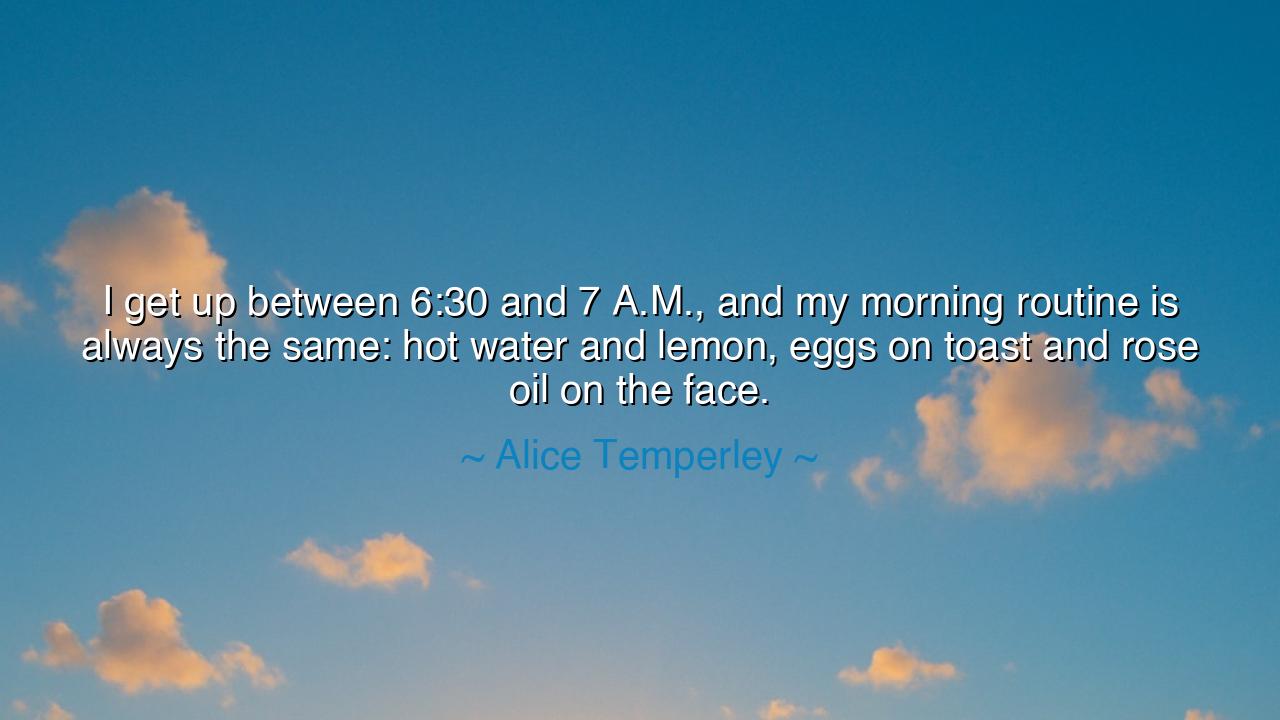
I get up between 6:30 and 7 A.M., and my morning routine is
I get up between 6:30 and 7 A.M., and my morning routine is always the same: hot water and lemon, eggs on toast and rose oil on the face.






"I get up between 6:30 and 7 A.M., and my morning routine is always the same: hot water and lemon, eggs on toast and rose oil on the face." — Alice Temperley. In these words, Alice Temperley speaks to the power of routine, the grounding force that anchors our days, shaping our actions and aligning our minds. Routine, while seemingly mundane, is an ancient practice that has been honored by those who seek to live intentionally. It is through the ritual of small, daily actions that we prepare ourselves for the challenges and opportunities ahead. Temperley’s morning ritual, from the warmth of hot water and lemon to the nourishment of eggs on toast and the gentle touch of rose oil, reflects a mindful commitment to starting the day with clarity, balance, and care. It is in these small moments that we find the power to shape our world.
In the ancient world, the great philosophers often spoke of the power of routine to cultivate wisdom and inner peace. Socrates, for instance, believed in the importance of daily reflection, of cultivating a disciplined life that was rooted in a routine of questioning and seeking knowledge. His life was one of daily habits, of conversation and reflection, which brought him ever closer to the truth. Temperley’s routine, though different in nature, follows this same principle. She rises with intention, choosing rituals that nourish both body and soul. Just as Socrates believed that true wisdom came from discipline, so too does Temperley find strength in the consistency of her actions each morning.
The ancient Romans had their own understanding of the importance of rituals in shaping one’s life. Marcus Aurelius, the Stoic emperor, wrote about the significance of beginning each day with a purposeful mind. He practiced a morning routine that involved centering himself on his duties and responsibilities as a leader. This deliberate approach allowed him to face the demands of his empire with strength and resolve. Like Aurelius, Temperley begins her day with intention, setting the tone for what is to come. The act of rising early and committing to rituals is a declaration of purpose—a promise to herself to move through the day with grace and clarity.
Consider also the example of Leonardo da Vinci, whose life was one of disciplined pursuit of knowledge and creativity. His mornings were often spent in quiet reflection and study, the foundation of his great achievements. While his routine was centered on intellectual pursuits, the underlying principle was the same: the importance of beginning the day in a way that fosters growth and focus. Temperley’s routine is similarly designed to set her on a path of nourishment and care, both for the body and for the spirit. In each act—the sip of hot water, the taste of eggs on toast, the soothing oil on her face—she is creating a moment of intention that prepares her to face the world with energy and vitality.
This ritualistic approach is not only a practice of personal care but a way of aligning oneself with the natural rhythms of the world. Ancient cultures revered the morning as a sacred time, the hour when one could connect with the divine and set the tone for the day. The Egyptians, for example, believed that the first light of dawn carried the blessings of the gods, and their rituals at sunrise were integral to maintaining balance and harmony in their lives. Temperley, by beginning her day with a series of mindful actions, similarly honors the sacredness of the morning, preparing herself to engage with the world in a way that is grounded and purposeful.
The lesson here is clear: routine is not to be dismissed as mere habit but understood as a tool of empowerment. Through small, repeated actions, we can shape our lives and find balance in a world that often seems chaotic. The morning ritual, like that of Temperley, can be a powerful tool for centering ourselves, for preparing the body and mind for the challenges ahead. By choosing what we do first thing each day—whether it’s a cup of tea, a moment of reflection, or the application of rose oil—we set the stage for a day of purpose and intention.
So, let us take inspiration from Temperley’s simple yet profound practice. Let us create our own morning routines that nourish us and prepare us for the journey ahead. Let us recognize the power of ritual in shaping our lives, of taking those first moments of the day to center ourselves in gratitude, clarity, and care. Just as the ancients found strength in their rituals, so too can we find power in the quiet moments that greet us each morning. In doing so, we will move through the day with a heart full of purpose and a soul aligned with our highest aspirations.






AAdministratorAdministrator
Welcome, honored guests. Please leave a comment, we will respond soon